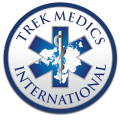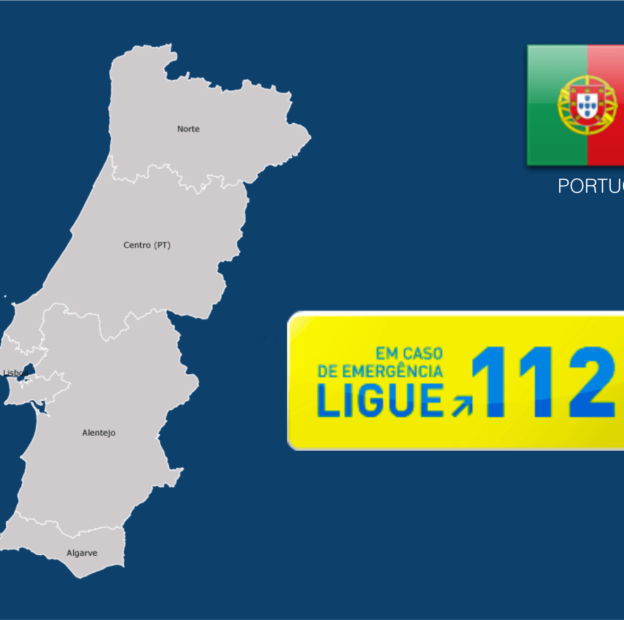AT-A-GLANCE
IN CASE OF EMERGENCY, DIAL 112 to reach an ambulance in Portugal.
Emergency medical services are a “relatively recent achievement” having started in earnest in Lisbon in the 1980s and spread rapidly across the country. Based largely on the French SAMU system, Portugal has made significant strides in a short amount of time, though coverage and quality are not uniform across the country.
HOW CAN I CALL AN AMBULANCE IN PORTUGAL?
IN CASE OF EMERGENCY DIAL 112 for Ambulance, Police and Fire
- All 112 medical calls requiring an ambulance in Portugal are transferred from police dispatch to Dispatching Health Center (CODU)
- Dispatcher technician completes questionnaire under supervision of regulating physician
- Non-urgent: Advice is given, no team sent
- Urgent: Vehicle sent staffed by physician and nurse
- Helicopters in specific situations
- Urgent, Non-Life Threatening: Ambulance with two technicians
- Patient transported to most appropriate hospital (with doctor and nurse, if necessary)
- Receiving hospital contacted by CODU with clinical details
- Dispatcher technician completes questionnaire under supervision of regulating physician
Yes, like Spain and France, Portugal relies on physicians and nurses to provide prehospital emergency care, with support from basic emergency technicians and ambulance support staff.
- Basic First Responders: typically police and fire service personnel
- Basic First Aid and BLS
- 40h of training
- National Standard Ambulance Technician
- Staff all INEM ambulances
- 210h of training
- Basic life support (BLS)
- Uncomplicated obstetric delivery
- Basic wound management
- Spine/fracture immobilization
- Oxygen administration
- Patient extrication
- Transport
- Medical Team: Physician and Nurse
- Highest level of prehospital care capabilities
- Anesthesiologists are most common medical specialty
- Nurses from the emergency department, intensive care unit or operating room
- National Minimum Curriculum and Additional Training
- 74 hours for doctors
- 104 hours for nurses (additional 40 is driving)
- All are able to deliver advanced life support (ALS), pediatric advanced life support (PALS) and advanced trauma life support (ATLS)
There are three types of response vehicles used as ambulance in Portugal:
- Rapid Intervention Vehicle
- Based out of hospitals
- Sent when advanced life support (ALS) is required
- Staffed with a physician and nurse-driver
- Manual Defibrillator
- 12-lead ECG
- Advanced Airway Mgmt
- Suction
- O2 Therapy
- Fluids
- Fracture Immobilization
- Pharmacotherapy
- Vital Signs Monitor
- Portable Automatic Ventilator
- Ambulances dispatched from Ambulance Centers
- Staffed by two trained basic life support (BLS) responders
- BLS and Rescue Equipment
- In rural areas not served by the CODU dispatch center, BLS responders attached to police and/or fire departments may be dispatched
- Staffed by two trained basic life support (BLS) responders
- Helicopter EMS
As of 2004 (Gomes), there were no national standards for hospital emergency departments in Portugal, with individual institutions in charge of determining the organization of their departments. Rarely do the hospital emergency departments have their own medical staff and the physical structure and organization of EDs varied considerably between hospitals. It was reported that there was an increasing awareness that this was unsatisfactory, as well as some optimism that a common national structure would emerge in the near future. Despite the concerns, it was reported that close relationships existed between clinical and prehospital providers, with bypass protocols for coronary disease, stroke and trauma routinely used to deliver patients to more appropriate facilities.
Health care is mostly a public service funded mainly through taxation: “Health subsystems and insurance companies are charged retrospectively for the medical service delivered” (Gomes, 257). It is not clear whether tourists would be required to pay for transport by ambulance in Portugal, and if so, how much.
ADDITIONAL INFO
You do not need any special vaccines to enter or travel in Portugal.
1965 – First EMS system started in Lisbon
- Staffed with unpredictably trained crew (usually consisting of policemen)
1971 – National Ambulance Service created
1980 – National integrated EMS system implemented
- National Institute for Emergency Medicine (INEM) created
- Governmental organization directly responsible to Ministry of Health
- Responsible for delivery of all aspects of prehospital emergency care across country
- Funded principally by government and partially by insurance companies
- 1% of all monies spent on health, vehicle and accident insurance transferred to INEM
1987 – First dispatching center specifically created for EMS in Lisbon
1989 – First physician-staffed advanced life support (ALS) ambulance in Portugal
2004 – EMS covers 75% of population with 4 dispatching centers and 21 physician-staffed vehicles
Emergency medical and ambulance services in Portugal are overseen by INEM (Instituto Nacional de Emergência Médica) which is a part of the national health system (SNS).
Gomes E, Araújo R, Soares-Oliveira M, Pereira N: “International EMS Systems: Portugal” Resuscitation 2004;62:257-60.
SCOREBOARD
% of Seriously Injured Transported by Ambulance
[Source: 2013 Global Status Report on Road Safety, WHO]
ROAD TRAFFIC INJURY DEATHS
(PER 100,000 POPULATION)
[Source: 2015 Global Status Report on Road Safety, WHO]
REPORTED HOMICIDES
(PER 100,000 POPULATION)
[Source: 2014 Global Status Report on Violence Prevention, WHO-UNDP]




